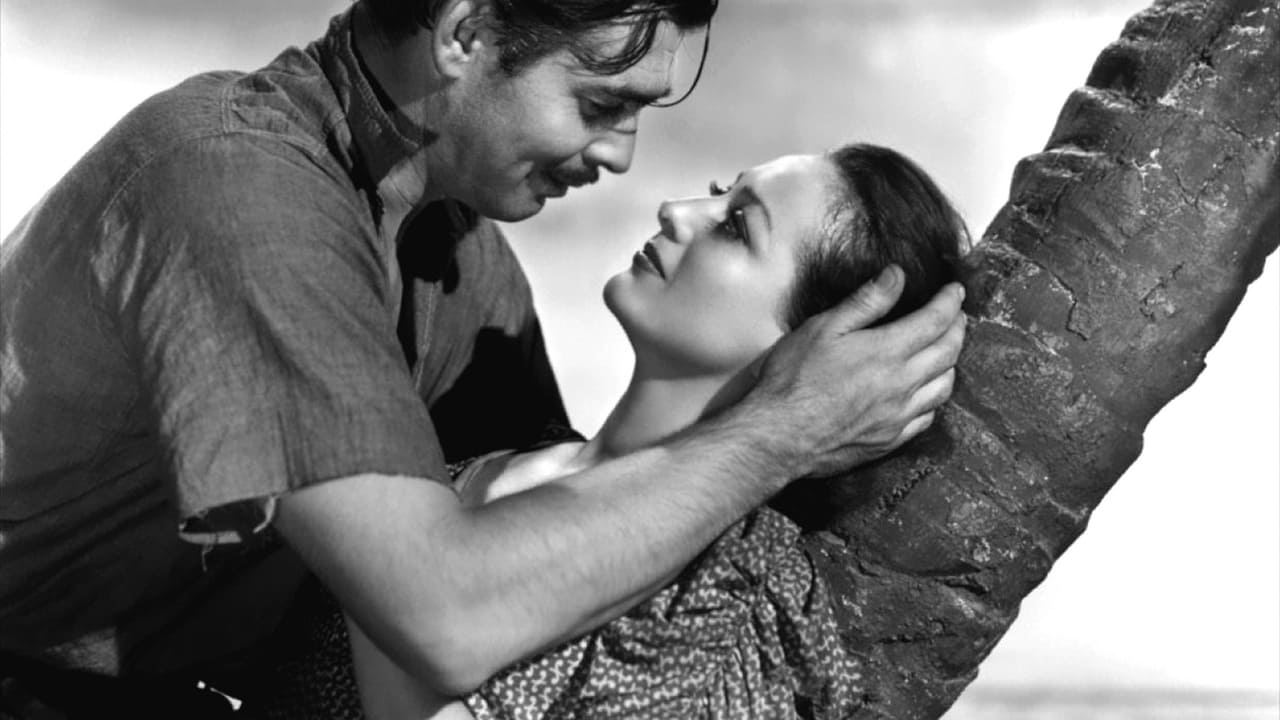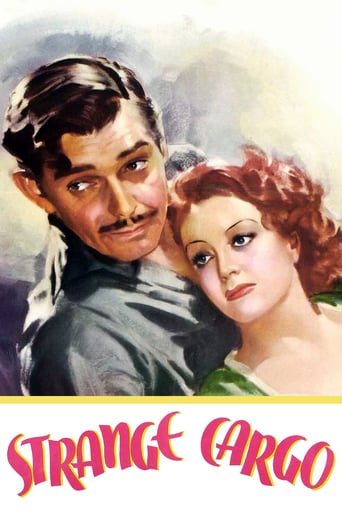

everything you have heard about this movie is true.
... View Morea film so unique, intoxicating and bizarre that it not only demands another viewing, but is also forgivable as a satirical comedy where the jokes eventually take the back seat.
... View MoreIf you're interested in the topic at hand, you should just watch it and judge yourself because the reviews have gone very biased by people that didn't even watch it and just hate (or love) the creator. I liked it, it was well written, narrated, and directed and it was about a topic that interests me.
... View MoreMostly, the movie is committed to the value of a good time.
... View MoreThe cargo isn't the only strange thing on this journey. However, the title does symbolically refer to its most unusual factor: A rather too obvious Christ-like figure played by Ian Hunter who tags along with some other prisoners attempting an escape from Devil's Island, a penal colony off the coast of French Guiana. One might suspect that this character's persistent appearance in the storyline would be a constant annoyance yet that's really not the case. He's rarely judgmental. His remarks about the others are always creatively intelligent, often unexpectedly helpful. He's even forgiving given these convicts' sordid backgrounds especially after witnessing their self-centered actions during the long and difficult escape. A notable example of his rather surprising response occurs when two of the convicts' (portrayed by Albert Dekker and a young John Arledge) very close and personal relationship ends when the younger one dies. Dekker not being able to cope without his friend (lover?) decides to take his own life. Yet Hunter neither condemns the suicide or the rather obvious homosexual relationship between the two. Instead he chooses only to reinforce the idea to Dekker as he's dying that it's not too late for him to reach a higher spiritual plateau. Besides, this spiritually symbolic figure is not just an observer he's a participant. For one thing he typically goes to great lengths (sometimes miraculous) to help the other criminals remain free! His presence right through to the end of this story will remain mysteriously, and perhaps awkwardly, ambivalent. Yet all of these characters are unique and multidimensional. Most are depicted as ruthless albeit creative opportunists. Foremost is Paul Lukas' serial killer having a past that includes disposing of his many wives for purely financial gain. He cynically but respectfully rejects Hunter's religious overtures right up to the end when they part company, bringing further realism to the proceedings. Now did I mention this film stars Clark Gable as one of the convicts and Joan Crawford as a thinly disguised prostitute? No? Well then I saved the best part for last. Their on and off again relationship (not to mention their dialogue which is snappier than a bus load of Japanese tourists) is priceless. Add the weird Peter Lorre as a prison informer who vies for Crawford's affections and you have one mismatched, very strange yet fascinating motion picture.
... View MoreThis is an uncomfortable Film to endure. It has a storyline that ventures from prison escape, to jungle trek, to slutty, wet romance, to Religious Allegory with transitions that are not at all smooth. The Star Power here is on hand to help through the deep concerns with playful bickering and cynical indignation.In fact, it is a wonder this thing got made at all. What with its, hardly ever filmed heavy handed, Christ analogies the Studio took a chance here at alienating at the least and angering at most many ticket buyers and Social groups. There is a deep Philosophical concern in this otherwise routine Adventure that won't be found in the usual escapism.It can be quite impressive in its glowing representation of a Saviour that is straight out of the New Testament and placed in the middle of Street Walkers, Murderers, and Thieves in a Jungle setting. There is a Supernatural feel among raw Nature and its handling of redemption is always within a setting of Angelic reflection and soft spoken words.This Movie will be a matter of taste for most as it can be seen as overdone and dense, melodramatic and melancholy. But it cannot be denied as a truly offbeat affair and for those seeking something unusual from the usual Star and Studio System, this is it.
... View MoreSTRANGE CARGO (Metro-Goldwyn-Mayer, 1940), directed by Frank Borzage, teams the romantic pair of Joan Crawford and Clark Gable for the eighth and final time. For their last union together, it became not only one of their finer performances, but an opportunity for something completely different. Gable, who retains his he-man disposition, appears sweaty and unshaven much of the time while Crawford, the tough girl reminiscent to her Sadie Thompson portrayal from RAIN (United Artists, 1932), abandons her glamorous style for second hand dresses to wearing little to no make-up whatsoever, adding touches of realism to their characters. Based on the story, "Not Too Narrow, Not Too Deep" by Richard Sale, the opening title, which reads, "Deep in the Culands ... a penal colony for men set aside to the forgotten by the world they live in ... for men to whom the present, the future and the past are one ... for men without hope," offers some indication to what's to be presented on screen.The plot revolves around a tough but likable convict named Andre Verne (Clark Gable), a thief by profession with three more years on his prison term. Coming out of his thirty days in solitary confinement, he's given the opportunity to work outside the prison walls by Griderv (Frederick Worlock), a good-natured warden. While on wharf duty on the pear near a French colony, Verne encounters Julie (Joan Crawford), a tough girl accompanied by Suzanne (played by uncredited Betty Compson). Having met his match, Verne breaks away from his returning line of 36 convicts to keep his "appointment" with Julie at Renard's Cafe where she works, while Cambreau (Ian Hunter), a mysterious figure who comes out of nowhere, steps in for the missing Verne. M'Sieu Pig (Peter Lorre), a "dirty rotten stool pigeon" with a passion for Julie who despises him, notifies the authorities after witnessing Verne sneaking into her dressing room from the outside window. After Verne makes a pass on her, Julie breaks away and turns him over to the law. Losing her job for harboring a wanted fugitive, Julie is given 12 hours to leave the colony. Back in prison, Verne assumes partnership with Moll (Albert Dekker), his arch rival, planning a carefully planned escape through the jungle leading them towards a boat that awaits him. To accompany him are fellow prisoners: Telez (Eduardo Cianelli), a religious fanatic; Hessler (Paul Lukas), a killer; DuFond (John Arledge), a former medical student; Flaubert (J. Edward Bromberg), a coward, and the mysterious Christ-like figure, Cambreau. Verne, who has picked up Julie along the way, comes along for the ride on the boat. While drifting along for days in the hot sun with no food and water, they all find themselves facing uncertainties ahead, their destinies known only by Cambreau.What makes STRANGE CARGO so fascinating is how the premise somewhat pre-dates the 1977 comedy, OH, GOD, starring George Burns in the title role. STRANGE CARGO might have been just another prison break related theme had it not been for a religious angle added to it. Had it not been regarded controversial, reportedly being given a "C" rating for condemned by the censors at the time of its release, Ian Hunter, in possibly the most significant role in his entire career as "the man who played God," might have been awarded an Academy Award nomination as best supporting actor. Interestingly, for a performance that nearly outshines the leading players of Crawford and Gable, whose chemistry is still strong since their initial union on screen in 1931, this might have paved the way for Hunter in leading roles, but regardless of his long resume as a movie actor, he hardly achieved any such stature.Also noteworthy is Albert Dekker, sporting a British accent (isn't he supposed to be French?), who makes a fine leader of the pack and threat to Gable's character. Their differences are brought out on the beach where two toughs fight it out. As for Peter Lorre playing the informer whom Juliue "could never get low enough to touch," is given little to do and plenty of time to do it.At 114 minutes, STRANGE CARGO tends to drag with some drawn-out sequences and limited underscoring, but film overall tends to be one of those that appears to get better with the passage of time. Distributed on video and later DVD, STRANGE CARGO can be found as a regular broadcast on Turner Classic Movies. (**1/2 Bibles)
... View More"Strange Cargo" is a 1940 film starring Joan Crawford and Clark Gable that leaves the usual story lines behind - romantic comedy, kept woman, rags to riches - as it weaves an allegorical tale of escaping prisoners and a Christ-like figure who accompanies them. Gable is Andre Verne, a prisoner on Devil's Island who escapes with several other prisoners (Paul Lukas, Albert Dekker, Eduardo Ciannelli, J. Edward Bromberg and John Arledge). During the evening count, he's almost found missing but another man, Cambreau (Ian Hunter) replaces him in line. He then boards the boat to the mainland with them and Julie (Crawford), probably a prostitute, who is escaping also from a lecherous bounty hunter (Peter Lorre).The prisoners fall on hard times as they escape through the woods and also while at sea when their water becomes tainted. Cambreau gives each prisoner comfort and helps them to confront the evil that brought them to Devil's Island, helping to bring them peace at last. This is not lost on Julie who sees a chance for redemption. Verne, however, isn't interested.This is a very simple story beautifully directed by Borzage. The atmosphere of the film is dark and haunting. There is no preachiness. The sheer power of Cambreau and his sense of faith is what brings the prisoners solace. Hunter is majestic in the role. Gable is appropriately tough, and Crawford brings depth to Julie, who thought she knew what she wanted. The rest of the cast is top-notch."Strange Cargo" seems like a film that was made in the early '30s with its Christian parable. This was the last film that Crawford and Gable made together. Its powerful message makes this a fitting ending for a fine MGM team.
... View More